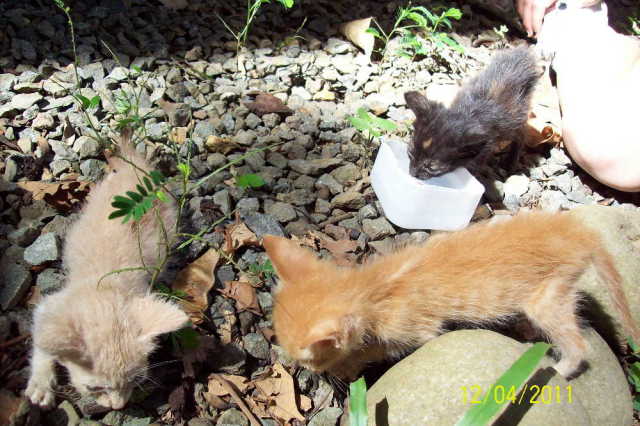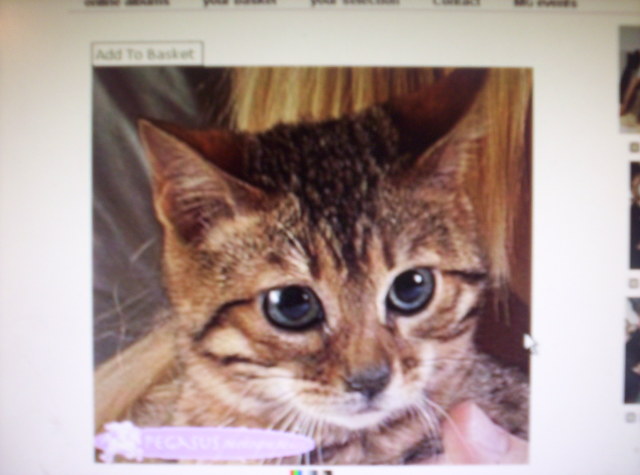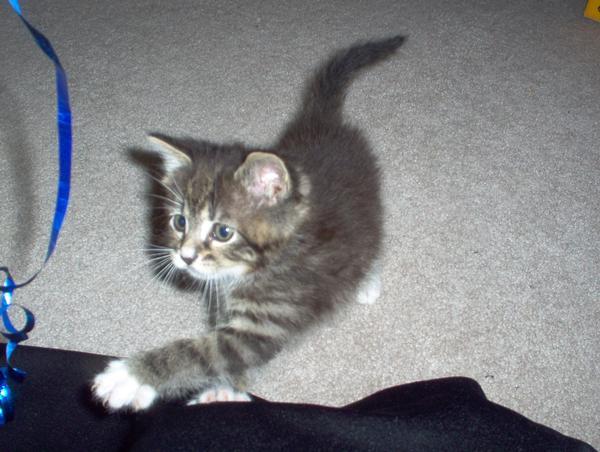QuestionQUESTION: Dear Sirs,
I have two cats and two dogs - they all get along great. One cat (Sully) is 17 and not very active these days. The other cat (Casey) is 2 and wants to play - these guys get along fine but Casey is bored. I wanted to wait to get another cat after Sully was gone because I didn't want to make it hard on him as I know there will be a "transition" time but I wonder now if I should just go ahead - I have my eye on an older cat at animal rescue - he is 4 and has lived both with cats and dogs before and done well. I like the idea of an older cat because I know what I'm getting - do you have any thoughts or ideas.
Much thanks,
Br. Paul
ANSWER: Br. Paul,
For everyone, I find with older cats, e.g. 2 years and up, they tolerate kittens much better than older cats, so a kitten 4 months to 8 months would probably work out the best. Pounds, humane societies, back yard breeders tend to want the kittens gone before 10 weeks of age. This is really to young to cope with the new environment, especially when there are already established pets at home.
Introduction of the newcomer to the already established pets should be done correctly to make the smoothest possible transition. Remember, cats have an intricate "getting to know you" ritual, for which humans just do not understand the rules. If you are interested, follow up and I will give you the protocol we use.
One last thing, some veterinarians tend to over vaccinate. For a new kitten, tender age (i.e. under 4 months), new environment, new food, new water, new "playmates", vets over vaccinating, often lead to a stressed immune system and a very ill kitten! I would be happy to point to the American Association of Feline Veterinarians recommendations for vaccinations, if you would like.
Best regards... Norm.
---------- FOLLOW-UP ----------
QUESTION: Dear Norm,
Thank you very much for responding - do you feel that an older cat, say 4 years old would work better than a kitten for us in this situation? Besides the one cat that is older and dying (17) we have a two year old one as well. I would very much appreciate whatever info you could give me in regards to the protocol you follow for a getting to know situation. Thanks again for your help.
Br. Paul
AnswerBr. Paul,
I still feel a kitten would work best. Cats are not enamored with meeting other cats, the older the more difficulty in getting them to adapt to each other. However, it seems that most adults are much more tolerant of kittens than other adult cats.
Here is the protocol we use for working a kitten or cat into a household with established pets:
Start out your new cat or kitten in one room with a litter pan and water dish. Ideally, the one room should be a bedroom with yourself or another human resident. This accomplishes a couple of things. Your new cat or kitten will not be overwhelmed by its new surroundings and get "lost", and thusly will have no problem finding the litter pan (often kittens or rescue cats have been confined and are somewhat daunted by wide open spaces!). You will feed the new cat or kitten in this room and keep the established pets out. It allows the new cat or kitten to bond with you or another human being and also build up some self assurance in its new surroundings since it will not have to compete for food or attention right away. Finally, it allows the new cat or kitten and the established pets to sniff each other under the door and get familiar with each others' scents.
After 3-5 days of being in its one room, it is time to let them meet each other. Be prepared for some posturing, some spitting and hissing, and the like. IGNORE IT! After a while, they should begin chasing each other about and still have the occasional hiss or spit as they get accustomed to each other. Cats tend to make a whole lot of noise and even loosen up some fur. Rarely will two cats hurt each other.
Once they are introduced, there are a couple of things you must remember. Do not separate them again, they will get along! Do not interfere in their "discussions" as they need to sort it out amongst themselves!
It does not hurt to give the established pets treats and extra attention after the new cat or kitten is introduced (yes, cats do get jealous!).
A couple of things you may have to do are to feed them on separate dishes. Provide more than one litter pan in different areas of the household (as cats can be very territorial about litter pans).
All, in all, this method seems to have had great success in the past and makes for a fairly smooth introduction. Please remember that they may make up immediately, or it may take a few weeks.
Best regards... Norm.

 Orphaned baby kittens in the rainforest
Question
kittens
Hello,
My wife and I are volunteers in
Orphaned baby kittens in the rainforest
Question
kittens
Hello,
My wife and I are volunteers in
 tatty kitten
QuestionQUESTION: Hi i have adopted a bengal kitt
tatty kitten
QuestionQUESTION: Hi i have adopted a bengal kitt
 shots/food
QuestionQUESTION: Teresa,
Silver is a wild kitten we he
shots/food
QuestionQUESTION: Teresa,
Silver is a wild kitten we he
 my cat is REALLY long, like a weasel!
QuestionQUESTION: Im hoping you can help me identify my
my cat is REALLY long, like a weasel!
QuestionQUESTION: Im hoping you can help me identify my
 runts
Question
stubby(my cat)
Can the mother chew off
runts
Question
stubby(my cat)
Can the mother chew off